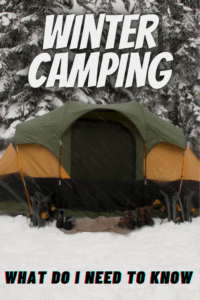
You have camped during the summer months all your life. But you never thought about winter camping until now. With everything going on right now with the world, you want to just get away for a few days and enjoy the solitude of camping. Problem is that it is winter and there is now snow on the ground and it is cold. Cold during the day, even colder at night.
What Do You Need To Know About Winter Camping
Is Winter Camping Dangerous?
What Tent Should You Use When Winter Camping?
Planning on camping in a tent? You need a tent that is rated for 4 seasons and is waterproof. A 3 season rated tent is for Spring, Summer, and Fall, the material is thinner and not made to hold up to the freezing temps. If you are planning on using a small tent stove, you need to have a tent that is made with canvas or polycotton and equipped with a stove jack built-in for the stove flue.
Sleeping Pads Are A Must
Do not place your sleeping bag directly on the floor of your tent. Pack an Insulated, Closed-Cell Foam Sleeping Pad. For each sleeping bag. You want to have some type of barrier between you and the cold ground and just the tent floor won’t be enough. Having the sleeping pad as a barrier will help prevent the cold ground from “siphoning” your body heat away from you.
You Need To Pack The Right Food
Packing Food for a Winter Camping trip is different than packing for a summer trip. Pack more food than you normally would during a summer trip, you will need to eat more often to keep your energy level up. You will be dealing with burning more energy simply by trying to stay warm. If you are tent camping in the woods, you will burn more calories just hiking thru the snow and setting up camp. You need to pack foods that will easily and quickly restore those calories.
Due to the colder temps, the food you pack can stay fresher longer if needed. Plus, you won’t need ice for your cooler. Don’t bring foods that are a high percentage of water, they may freeze. Dehydrated or freeze-dried foods are the best option when possible.
Always Be Prepared For Bad Weather
As much as the weather is always unpredictable when camping, weather changes during winter camping are more problematic. While a rainstorm during a summer camping trip can be disappointing, bad weather in the winter can be life-threatening if you are not prepared. Pack a tarp you can place over the top of your tent to help prevent wet snow from melting and leaking into your tent. Pack a lightweight snow shovel so you can shovel away any unexpected snowdrifts from high winds or from a snowstorm. Keep a dry set of clothing packed away inside your tent.